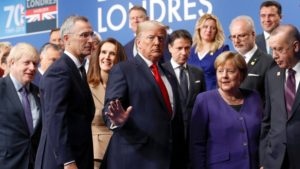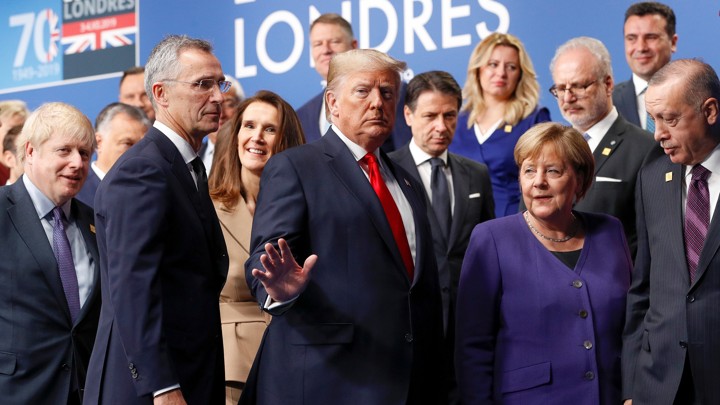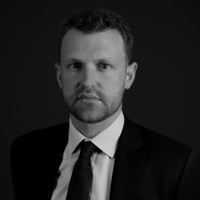

Addressing his fellow members of Parliament—some of whom remained sympathetic to Moscow, Britain’s wartime ally, and its philosophy—Bevin said the British government wished to see the “spiritual unity of Europe,” but had been dealt a fait accompli in the East, which had fallen into Soviet domination. “No one there is free to speak or think or to enter into trade or other arrangements of his own free will,” Bevin said. “Neither we, the United States nor France is going to approach Western Europe on that basis. It is not in keeping with the spirit of Western civilisation.” Bevin declared that if the West was to come together, “it must be a spiritual union.” While there would be treaties and agreements to make it real, ultimately, he added, “it cannot be written down in a rigid thesis or in a directive. It is more of a brotherhood and less of a rigid system.”
What can possibly be said to connect Viktor Orbán to Justin Trudeau, Donald Trump to Emmanuel Macron, Boris Johnson to Angela Merkel? In just the past two days, Turkish President Recep Tayyip Erdoğan has questioned Turkey’s commitment to the alliance’s principle of collective defense, Macron has attacked Turkey’s intervention in Syria, and Trump has suggested that the U.S. will impose tariffs on NATO allies. Here is a spiritual union that no longer appears spiritually connected, its members unable to agree on who they are, what they stand for, or even their principal enemy. Does the West, as Bevin described it, still even exist?
For NATO’s first secretary-general, Winston Churchill’s wartime aide Hastings “Pug” Ismay, the task was comparatively much simpler: “Keep the Soviet Union out, the Americans in, and the Germans down.” For Ismay’s successor today, former Norwegian Prime Minister Jens Stoltenberg, the challenge has changed entirely. The Soviet Union is gone and the Germans are so comfortable being “down” militarily that the Americans, or at least their leader, are questioning their commitment to the alliance altogether. Add to this the personal animosity among the leaders exhibited this week—the summit ended with Trump canceling a press conference after a video emerged of Trudeau, Macron, and Johnson mocking him—and the fabric keeping the alliance together looks painfully stretched.
Ahead of this week’s meeting, Macron took NATO’s problems on headfirst, tackling the United States’ waning rhetorical commitment to Europe’s collective security and drawing his own stark conclusions. “We should reassess the reality of what NATO is in the light of the commitment of the United States,” Macron told The Economist. “We now need to clarify what the strategic goals we want to pursue within NATO are.” Macron said NATO was suffering a “brain death” by not addressing the question of what the alliance was for and how much Europe needed to take control over its own defense in light of growing American disengagement. He was particularly furious about the Turkish invasion of northern Syria, implicitly sanctioned by the U.S., which he believes assisted terrorists—the security threat he speaks most passionately about.
There is no realistic scenario in the foreseeable future in which a combined European force can match the U.S.’s military strength, political will, and operability. The region’s emerging military capacity remains painfully weak and is likely to remain so, British officials who spoke with me said. Macron was kidding himself if he thought otherwise, even if his analysis of the problem was accurate.
Old heads argue NATO goes through cycles of self-doubt and introspection. One official said there were “massive rows” every 10 years or so—and the protagonists, as today, are usually France and the U.S., while the Brits and Germans watch on, urging calm. “That’s still true,” the official said.
Yet the very fact that the world moves on also means NATO cannot stand still. Throughout the Cold War, while the alliance had a clear enemy, there were fierce arguments about the merits of first-strike policies and the use of tactical nuclear weapons. The end of the Cold War saw fresh challenges regarding expansion of the alliance, and ethnic cleansing on its doorstep.
Former British Foreign Secretary Malcolm Rifkind told me NATO’s current problems needed to be put into perspective. “The French have a history of saying things that will shock NATO,” he said. “France always likes to be different. Some of what Macron has said is justified, and it is overwhelmingly because of Trump.”
Former U.S. Secretary of State Henry Kissinger has suggested that the effect of Trump’s presidency—not his intention, but his effect—could be to shock Europe into standing on its own feet. “It would be ironic if that emerged out of the Trump era,” Kissinger said, in an interview with the Financial Times. “But it is not impossible.”
American frustration with Europe did not start with Donald Trump and will not go away should he fail to win reelection next year. The challenges posed by both the U.S. and French presidents are here to stay.
In Robert Gates’s farewell speech to Europe as Barack Obama’s defense secretary in 2011, he warned of a “growing difficulty for the U.S. to sustain current support for NATO if the American taxpayer continues to carry most of the burden in the Alliance.” He noted with what appeared to be almost despair that Britain and France could not have carried out the 2011 intervention in Libya without the support of the United States.
The French are saying Europe cannot wish Trump’s arguments away, that the Continent needs to stand up for itself. But equally, Macron cannot wish away Europe’s strategic weakness and the reality of NATO, and the Americans and the British cannot wish away Macron’s analysis either. And all the while, no side has any strategy to deal with Russia’s hybrid warfare, nor the rise of China, which is seen as a threat to some and an opportunity to others.
The West still exists; it just no longer so clearly overlaps with NATO. It includes Australia and New Zealand for sure, but also, to some extent, Japan. If anything, it might become more relevant as its economic and institutional security become more under threat from different, non-European models.
If NATO were abolished, the West would quickly try to re-create something that looked very similar. The NATO that does exist, though, remains trapped by knowing it needs to change, while not quite knowing how.
We want to hear what you think about this article. Submit a letter to the editor or write to [email protected].




